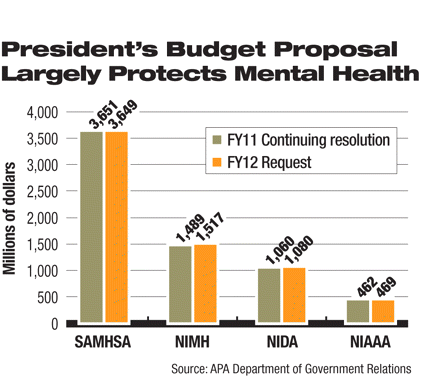Obama Budget Holds Steady On Mental Health Funding
Abstract
At a time when avoiding cuts can be viewed as a win, President Obama's new budget proposal is mostly positive for mental health.
With no approved Fiscal 2011 budget, federal spending for mental health programs has remained at 2010 levels. In the new Fiscal 2012 proposal, released in February, the president is asking for an overall increase in this area. However, the increase basically represents maintaining the status quo, at less than 3 percent.
Considering the current fiscal climate, APA is "encouraged by the president's proposed budget," said Lizbet Boroughs, deputy director of APA's Department of Government Relations.

Under the president's proposal, the National Institutes of Health (NIH) would receive a $1 billion increase. For NIH's three mental health–related institutes—the National Institute of Mental Health, National Institute on Drug Abuse, and National Institute on Alcohol Abuse and Alcoholism—this would mean increases of $28 million, $20 million, and $7 million, respectively.
The Substance Abuse and Mental Health Services Administration (SAMHSA) budget, which accounts for the bulk of the federal government's funding for mental health services, would see a $2 million decrease. However, there is a new $10 million line in the SAMHSA budget for returning members of the military and their families. This money would be used for block grants to improve access to mental health care, including substance abuse services, by increasing the number of local community health centers, which are more likely to draw in veterans due to ease of access, and the number of suicide hotlines dedicated to military personnel.
In addition, these block grants could fund research on new ways to use technology to reach out to the younger returning veterans. SAMHSA is testing virtual-treatment computer models that can be used at home, which younger, tech-savvy vets are more likely to try, as opposed to going to a mental health care facility.
A big winner in the proposal is the Indian Health Service, which would see a substantial increase in funding, including an additional 14 percent, or $422 million, for clinical services.
The SAMHSA budget is posted at <www.samhsa.gov/Budget/FY2012/SAMHSA-FY11CJ.pdf>. The NIH overview of the president's budget is posted at <http://officeofbudget.od.nih.gov/pdfs/FY12/Volume%201%20-%20Overview.pdf>.



